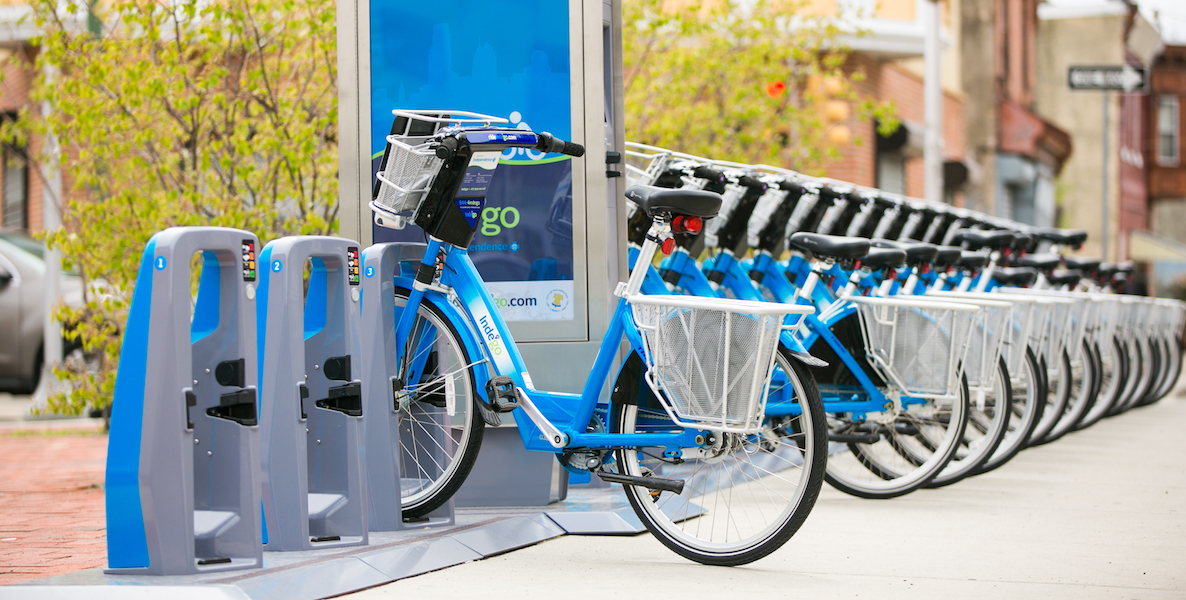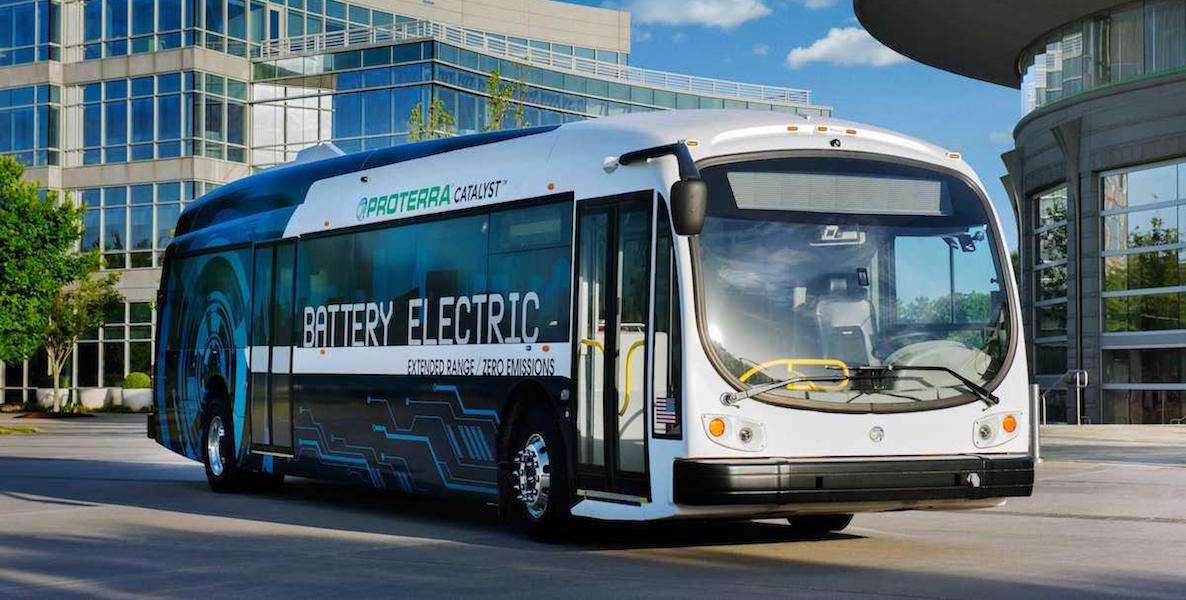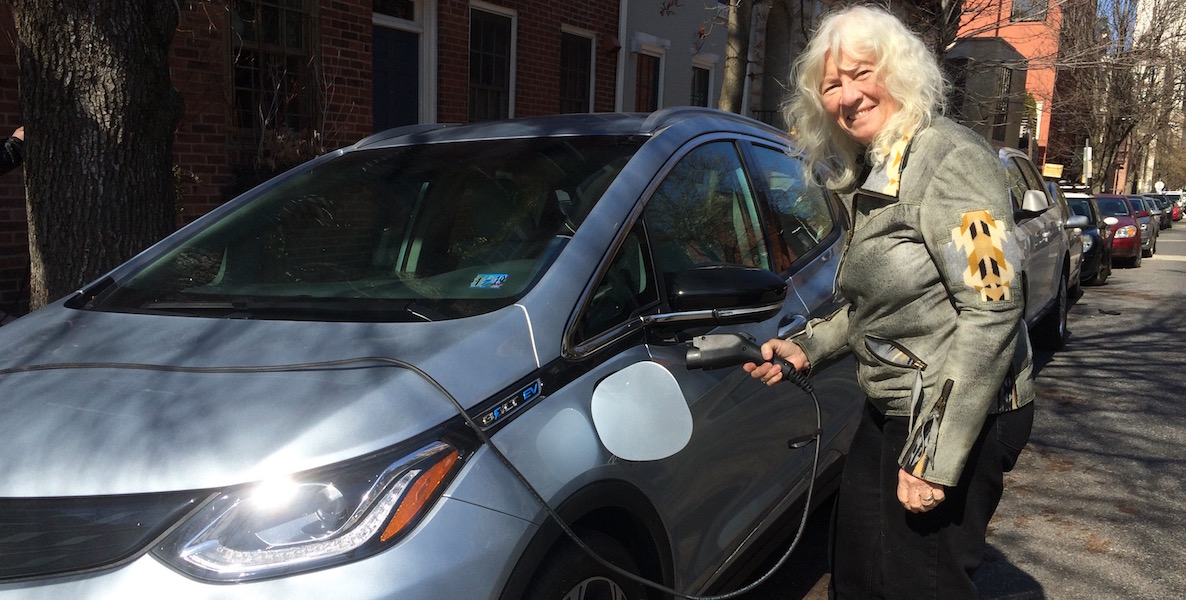Late last year, Philadelphia author and activist Judy Wicks joined the few hundred electric vehicle owners in the city; she replaced her 15-year-old Prius with a new Chevy Bolt. An early adopter of clean energy technology, Judy knew to expect challenges.
First, she had to get a handle on a few basic advances in car technology that have developed since 2003. Features like the key fob, start button, Bluetooth phone connection, rear-view camera, and touch-screen sound and navigation system were new to Judy. But getting used to a more automated driving experience was the easy part.
“The hardest thing is finding a place to plug it in, especially when the parking place in front of my house is taken,” she says. Unlike most electric cars, the Bolt can be charged using a regular wall outlet, which is particularly beneficial to Judy; when she plugs in at her house, she knows she’s using clean energy to run her Bolt.
“After cutting off my natural gas supply and converting to an all-electric house, getting my electric car was the last step in making my household carbon-free,” Judy says. “My main motivation is climate change, and how oil exploration is harming indigenous people around the world.”
“Decreasing emissions benefits the public good,” Judy says, “Why wouldn’t we incentivize converting to clean fuel?”
The solar panels on her roof garner enough energy to run her home in the summer and fall. During winter and spring, she buys electricity through PECO from Community Energy, a 100 percent solar powered supplier in Lancaster County.
“It only makes sense that I should choose my own energy to put in my car,” Judy says.
The problem is getting that parking spot in front of her house when she needs to charge.
Stories about transportation in PhillyRead More
After scouting the city, I came up with a few options:
One, drive to the city’s sole fast charging station on Christopher Columbus Blvd and dart off to the nearest coffee shop to work for twenty minutes, then return to initiate another charge (the charger only works in half hour increments). Repeat.
Two, pay for parking in the Barnes lot and study the collection during the 8 hours it will take the car to charge.
Three, enjoy breakfast, lunch, and dinner at “Restaurant Row” in Whole Foods on Callowhill while charging up in the parking garage for free.
“After cutting off my natural gas supply and converting to an all-electric house, getting my electric car was the last step in making my household carbon-free,” Judy says. “My main motivation is climate change, and how oil exploration is harming indigenous people around the world.”
Four, keep a watchful eye on the spot in front of her house, jumping at every opportunity to move the car within range of the extension cord that stretches from her second floor balcony into a crook in the tree across the sidewalk and into the plug-in on the driver’s side of her arctic blue electric car.
I didn’t actually carry out the second or fourth option, though we do plug in at Whole Foods while picking up groceries. I’ve driven to the fast charger on Columbus Blvd when we’re in a pinch, but we mostly rely on plugging into the outdoor socket at Judy’s daughter’s home in Chestnut Hill during her weekly visits and jockeying for the space in front of her home.
Judy didn’t foresee this charging challenge when she first considered buying an EV. She planned to install a charger and reserve a space through the city’s Electric Vehicle Parking Space (EVPS) program, part of Mayor Nutter’s initiative to to reduce greenhouse gas emissions in Philadelphia. But in April 2017, City Council suspended the program and began to roll back 10 years of implementation.
Contact the Electric Vehicle Policy Taskforce directlyDo Something
Yes, we live in a city with extremely high demand for parking; we all dread looping around the neighborhood for a half hour in search of a spot at the end of a work-day. But how could we let petty parking squabbles stand in the way of improving air quality?
“Decreasing emissions benefits the public good,” Judy says, “Why wouldn’t we incentivize converting to clean fuel?”
Philadelphian trailblazers like Judy will continue to buy electric cars and figure out ways to charge. Better keep up, City Council—there’s no time to step back.
Katherine Rapin is Judy Wicks’ “Deputy Ranger,” and a freelance writer. Wicks, a Philly legend, is former owner of The White Dog Cafe, and a sustainable business and energy advocate.
Photo via Judy Wicks






